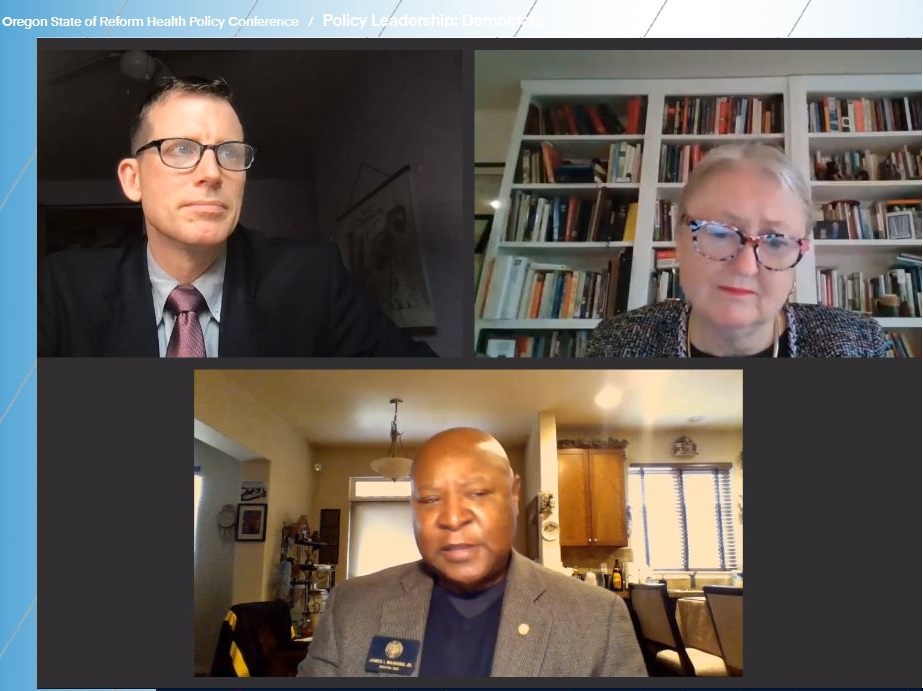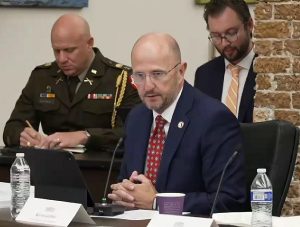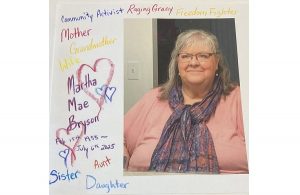Oregon Democrats talk universal health care, fixes for nursing shortage
6 min read
Sen. James Manning says Oregon businesses will benefit from universal health care, as Sen. Deb Patterson and Rep. Marty Wilde listen during the 2021 Oregon State of Reform conference Oct. 26.
Oregon legislators spoke at the Oregon 2021 State of Reform conference. Sen. James Manning serves on the Universal Health Care Task Force.
[00:00:09] Sen. James Manning: I believe that healthcare is a human right, as I do believe education is a human right. In order for us to achieve a more perfect union, it begins with how we treat each other, and healthcare is a very vital part of that. Denying healthcare means that we are denying the quality of life that so hope many of us aspire to enjoy.
[00:00:36] Say we adopt a universal healthcare system where every Oregonian, if you, if in this state you have access to quality healthcare, regardless of ability to pay or inability to pay, it is a human right. In my mind, what that will do is, it will help spur on job creation. Here is why. If you are an employer and you’re looking to establish a new location for goods and services, and you have a workforce that already has medical coverage in place, my hope is that they would be more inclined (to locate in Oregon) because the cost of providing healthcare for an employer can be little bit of a challenge. We see that now with some of the small businesses in my district that want to provide healthcare, but they can’t because of the affordability factor. So if we can eliminate the affordability factor as a barrier to bring in more businesses, because you already have a functional health care system that’s working, I think that that would be more attractive to a lot of businesses.
[00:01:51] We already provided healthcare in 2019 for 450,000 Oregonians that didn’t have healthcare. We have covered all kids. We have an indigenous community that we provide for health care and dental care. We have other small buckets of healthcare — imagine if we pull all these together and we’re looking at employers and these astronomical costs that deals with administrative overhead. So by reducing that they will pay a fraction, because right now, they’re paying exorbitant amounts of money. If we can eliminate all of that into a universal healthcare system, I think that will be something that will set Oregon above all others and other states will strive to emulate what we’ve done.
Thank you for supporting
local citizen journalism
[00:02:42] It’s called a community and it’s the right thing to do. For me, having little kids that need medical care, having people that have chronic illnesses and diseases that can no longer afford treatment—we’re talking about humanity. We’re talking about how we treat each other. This is a part of that. We’re in a community and I know that we can get there. We’ve got so many good people here in this great state and they’re all care about same things that we all do: Good health. Prosperity. Good education, good access to just being a good person here in this space.
[00:03:29] And again, the intent is to align for an initiative petition. I am willing to—and I’m not a gambling person—but I’m willing to bet that Oregonians will approved a universal health care, knowing that they will never, ever have to worry about excess or equitable access to health care.
[00:03:52] John Q: Sen. Deb Patterson also spoke at the State of Reform conference.
[00:03:56] Sen. Deb Patterson: in the last legislative session, we focused on looking at the best way to finance healthcare delivery in Oregon, which was central to the work of the task force on universal health care, which Senator Manning just spoke to a moment ago. We did pass Senate Bill 428, which was the bill that extended the work of the task force a bit because of the pandemic disruption in their process. We’ve also focused on addressing rising pharmaceutical costs and Senate Bill 844 puts in place the Pharmaceutical Drug Affordability Board with medical providers and medical ethicists without ties to the pharmaceutical industry and which will recommend strategies for addressing pharmaceutical costs in Oregon. We’ve also focused on quality of care, with bills such as Senate Bill 714, which addresses staffing ratios in long-term care, which incidentally also is the leading cause of bankruptcy for the middle class when they need long-term care. We’ve also focused on access, such as bills, ‘Cover All People,’ House Bill 2164, which Senator Manning mentioned, and, as well as Senate Bill 800, which develops a trust to help long-term care workers access health insurance comp coverage. Is there more to do? Absolutely, but we must work together or the broken system will bankrupt our state and it will take away other needed funds that we need for services such as education, public transportation development, and other things we need to get done in this state using public dollars.
[00:05:29] Rep. Marty Wilde: Hi, I’m Marty Wilde. I’m a state representative. I represent House District 11. I also have a degree in healthcare administration and am on the Senate Bill 770 committee.
[00:05:40] In terms of healthcare workforce, one of the things I’d really like to fix is: the nursing supply. There are certain professions that you should probably get free tuition at any public institution to do, and nursing, I think, is one of them. Our public community colleges, the size of their nursing programs, is not large enough. And so that has pushed nursing candidates into private colleges, which are often one-year programs, LPN programs and they don’t transfer. It’s something we really do need to work on at the state level because that’s something that we have a lot of control over. It is not easy. There are training rotations that need to happen in various community settings that you have to set up and that sort of thing. But we are having to pay traveling nurses in our hospitals exorbitant fees. We are, this is just something, a community capacity, that you should have. We should not just develop the minimum number of nurses necessary to meet the immediate demand.
[00:06:36] John Q: Sen. Manning suggested free education in exchange for service, and recognized Churchill High School.
[00:06:44] Sen. James Manning: I have a vision of having a university that offer programs to bring more nurses in. And here’s the deal.
[00:06:53] They, once they receive their certification, it would turn into a grant, but they will be asked to at least provide service in one of our rural or frontier counties for a couple of years. They will get the experience that they need, they will have the financial support, and hopefully they will stay in those communities because if we don’t provide incentives to have the healthcare professionals move into these communities, we’re still going to continue struggling. And nursing is one of the most important parts of this. So I am fully supportive on how we support more nursing programs.
[00:07:33] At one of my local high schools, Churchill High School, they have a high school nursing program where they are actually teaching high school students. They go, they dress in scrubs, the room that they’re in resembles a hospital ward, they learn to do certain things like blood pressure check, checking a pulse and all of these other things, and my hope is that they will go on to improve and expand those programs and become meaningful and willing medical practitioners here in our great state for the people here.




